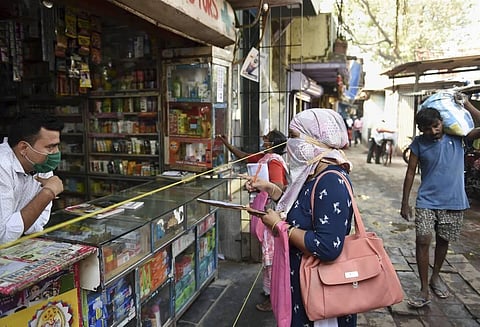Cured but ostracised: Leprosy survivors' ordeal far from over, continue to battle stigma
NEW DELHI: They have been cured of leprosy years ago, but Malesh still cannot eat at restaurants or travel in public transport without inviting uncomfortable glares to his bandaged hands, while Saheli is forced to beg after being denied jobs for her appearance.
Malesh and Saheli's situation is shared by several others at the West Patel Nagar Lok Mata Kusht transit camp where around 43 families of leprosy survivors reside.
Everything is separate for the camp's residents whether it be temples, grocery shops, milk booths or drinking water taps, said a leprosy survivor, who believes that society makes even the cured feel like "untouchables".
"People give me dirty looks. Till date, we do not get served in restaurants and have to take our own vessels if we want to eat food. When we travel in public transport like buses or autos, no one wants to sit next to us," said Malesh, 55, who was cured of the disease 18 years ago but suffers from deformities to his hands and legs.
For Saheli begging was the only option left after she was denied employment on several occasions as people turned her away because of her appearance and physical deformities.
"I did not even have the option to work. As soon as people saw deformities of my body, they turned me away. I am now forced to beg but that is the only way I am able to manage two meals a day," the 42-year-old said.
Not just for survivors but even for their non-leprosy-affected children getting employment is difficult with the camp as their address.
"When people see the leprosy camp as our address, they make excuses to not give us employment. Many of us, including myself, have to lie to get a job or give a fake address," the camp's caretaker Jaya Reddy said.
The Lok Mata camp is part of the Katputli Colony of West Patel Nagar but most survivors and their family members cannot mingle with others freely. They say this is because of the stigma associated with the disease.
On difficulties of being a camp resident, Saheli said, "There are just two taps for us in which water does not come most of the time. We are not allowed to fill water from the taps of surrounding areas because of stigma around leprosy."
Reddy, who was born at the camp after her parents moved from Telangana to Delhi after being shunned by their families, rued that there is no government help for them.
"There is so much stigma we face. People will not stand close to us anywhere, if they see us drinking water from a tap then they will scold us for infecting it. I am the representative of this colony but at most places I face reluctance of people to be associated with us," she said.
Leprosy is a chronic infectious disease but it is curable and treatment in the early stages can prevent disability.
It affects the nerves, skin, eyes, and lining of the nose, according to the Center for Disease Control and Prevention.
With the aim to make India leprosy-free, the government had launched the National Leprosy Eradication Programme which aimed at treating the disease as well as removing stigma and discrimination.
Reddy said the Covid pandemic further worsened their situation.
"People became more wary of us. Many of us lost our jobs and were pushed to the brink of starvation in that period. There was no help for us at all from outside and we used most of our savings in these two years of Covid," she said.
The transit camp was established in 1990 and it was then, most the leprosy-affected people, who were shunned by their families, moved here.
Currently, over 156 people reside in the camp and most of them from Andhra Pradesh and Telangana.
Leprosy, also known as Hansen's disease, is endemic in several states and Union territories of India, with an annual case detection rate of 4.56 per 10, 000 population. The prevalence rate of leprosy is 0. 4 per 10,000 population in the country.

